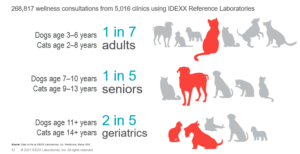

Understanding why it’s important to do preventative care testing for your pet
New Data demonstrates that it is important to conduct diagnostic tests as part of a thorough annual check up.
Here at Capital Veterinary Hospital we want to provide the best care for all animals and thus keeping your pet healthy is important to us. Our dedicated team of vets and nurses conduct ongoing studies which gives you peace of mind that your pet is given the best possible treatment at every visit. Therefore, we are now recommending blood, faecal and urine tests to be part of the annual check up.
Recent studies indicate that when we do diagnostics on patients that seem healthy, we uncover potential disease. And if left undiscovered and untreated, it can decrease the quality of, and possibility shorten your pet’s life.
In fact,

had abnormal findings even though they looked healthy.
Why do Screening tests when My Pets Seems healthy?
Just like in us humans, diseases often start as hidden or subclinical. We don’t see clinical signs, but diseases can grow and develop without us knowing. But unlike humans, our pets can’t tell us and describe what is happening in their bodies. They often hide signs of disease, because if they were in the wild, they might be seen as prey. Pets can’t use words, so preventive care screening testing is a way to give your pet a voice.
Further, our pets age quicker than us, thus changes in disease status can occur quicker. Screening diagnostics can help catch potential health issues earlier, before they become advanced disease that require more expensive interventions.
Screening tests is like insurance
With insurance we pay a relatively small amount up front hoping that we do not need to use the insurance, but if we do, we are covered from needing to pay huge sums of unexpected expenses. Preventive care screening tests are conducted hoping to not find any hidden disease, giving you the peace of mind that we have conducted a thorough investigation of your pet’s health, not only physically but also at cellular level. However, if we detect disease in its early stages, when it is most likely to respond to treatment, we can help you avoid significant medical expense and risk to your pet’s health. Further, routine preventive care screening also helps us establish normal baseline laboratory values when your pet is young and healthy. Even subtle changes from baseline values can help identify disease much earlier as your pet ages, long before they become apparent to us.
What happens?
Blood tests can be carried out during a regular consultation. Generally, a small amount of hair from your pet’s leg or neck will be clipped and we sterilise the area and collect blood with a syringe needle. The blood is then placed in tubes and processed here at the hospital or if more detailed information is required, it will be send away to an external laboratory.
